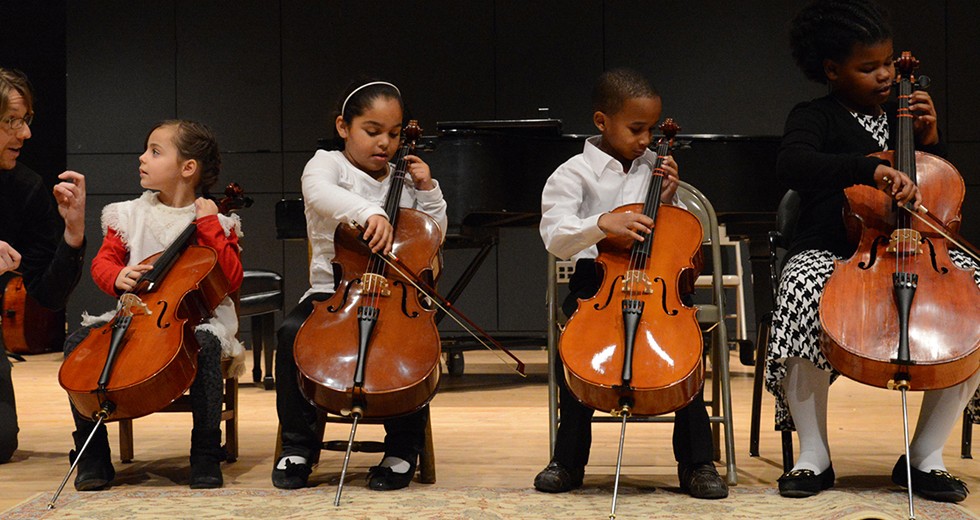Music Haven

Music Haven, an after-school arts program in New Haven, Conn., provides an opportunity for young students to learn music and practice citizen musicianship within their community. The program is anchored by a string quartet that dedicates its time to teaching students and performing in the community; coincidentally, two of the musicians are alumni of the Civic Orchestra of Chicago. The program offers free one-on-one and group lessons for students in New Haven’s community.
Tina Lee Hadari is the founder and executive director of Music Haven. When she formed the organization in 2006, Hadari maintained one central idea: that professional musicians have the ability to bring change and transform the city of New Haven.
Music Haven exemplifies citizen musicianship – not only do Music Haven’s faculty members practice it, they encourage their students to do so as well. “We want them to experience good citizenship in music. Our goal is for them to become fantastic citizens of the community,” says Hadari. Because of the dedication of Hadari and her staff, the organization has managed to connect with very different members of the community, all with the help of music.
Hadari was inspired by Community MusicWorks, as well as members of the New Haven community. Marc Mann, the current board president, approached Hadari after seeing Community MusicWorks in action, believing that she would be able to start something similar in their community. Hadari took to the challenge, and the program has continued to thrive and grow.
In its inaugural year, the organization served 23 second- and third-grade students, many of whom are still in the program today. Now there are 74 students, ranging in age from 4 to 14, participating in the program. It is Music Haven’s goal for the students to continue through their high school graduation.
“After-school youth programs are the heart of the organization,” says Hadari. Each participant is required to attend one half-hour private lesson, as well as one hour-long group class. The students can also participate in the Music Haven orchestra, Harmony in Action. All classes, lessons and instruments are provided to the students for free.
Hadari noted that while the first few years of the program were challenging, seeing what Music Haven was able to do for the community made all of the hard work worth it. What does Hadari love most about the program? “The people and the relationships that we’ve made with them. Sometimes that can be the most challenging aspect of the program, but it’s also the most rewarding.”
The organization has had an outpouring of support from the community, and Hadari contributes that support to the location, and the staff’s hard work to make the “Music Haven Family” as strong as possible.
“New Haven is very rich in cultural resources and is very diverse in its population – unfortunately, it is also high in poverty. We felt that we could assume a role to contribute to community change by helping youth and community members through music.”
The impact that the organization has had on the community has been very positive. In January 2014, Music Haven partnered with St. Luke’s Episcopal Church Steel Band and performed a collaborative concert for Martin Luther King Day. The event was standing-room only, and ended with Music Haven and St. Luke’s Steel Band and students playing “Lean on Me” – the audience joined in as well.
Music Haven is anchored by a string quartet consisting of professional musicians. Not only does the quartet play for the community of New Haven, but its members also are the organization’s teachers. Two quartet members, Philip Boulanger and Gregory Tomkins, are both alumni of the Civic Orchestra of Chicago, a signature program of the CSO’s Institute for Learning, Access and Training.
Tomkins believes that his experiences as a Civic musician have helped him during his time at Music Haven: “Yes! [Being in] Chicago was the first time that I felt like I was involved in a community. I remember being able to invite my students to see my Civic concerts – that’s what provided the basis of experiences that I wanted to bring to Music Haven.”
Tomkins was also inspired by Judson and Joyce Green Creative Consultant Yo-Yo Ma and the Citizen Musician Initiative.
“I remember my first year in Civic was also the first year that Yo-Yo Ma was involved. It was fantastic to hear about a topic that isn’t addressed often in your average conservatory training – the idea that most musicians are focused on crafting their art rather than what the purpose of their art is, and how it affects the community.”
Philip Boulanger also believes that the work he did with Civic, along with the Music Activity Partnership program of the Institute for Learning, Access and Training, has been very beneficial to him during his tenure at Music Haven. “My experience as a MAP program Teaching Artist was helpful. We’re working on doing a similar thing here at Music Haven, the School Workshop, where we tie music into the social studies curriculum – connecting the folk elements of music to the cultures of Africa, Latin America, Asia and Europe, and also figuring out how that relates to American culture.”
Their favorite part about working at Music Haven? Hadari, Tomkins and Boulanger all replied with variations of the following: the opportunity to work with the kids and their families, and the opportunity to become a part of their community.
PHOTO: Philip Boulanger, an alumnus of the Civic Orchestra, works with cello students of Music Haven, an after-school arts program in New Haven, Conn.



